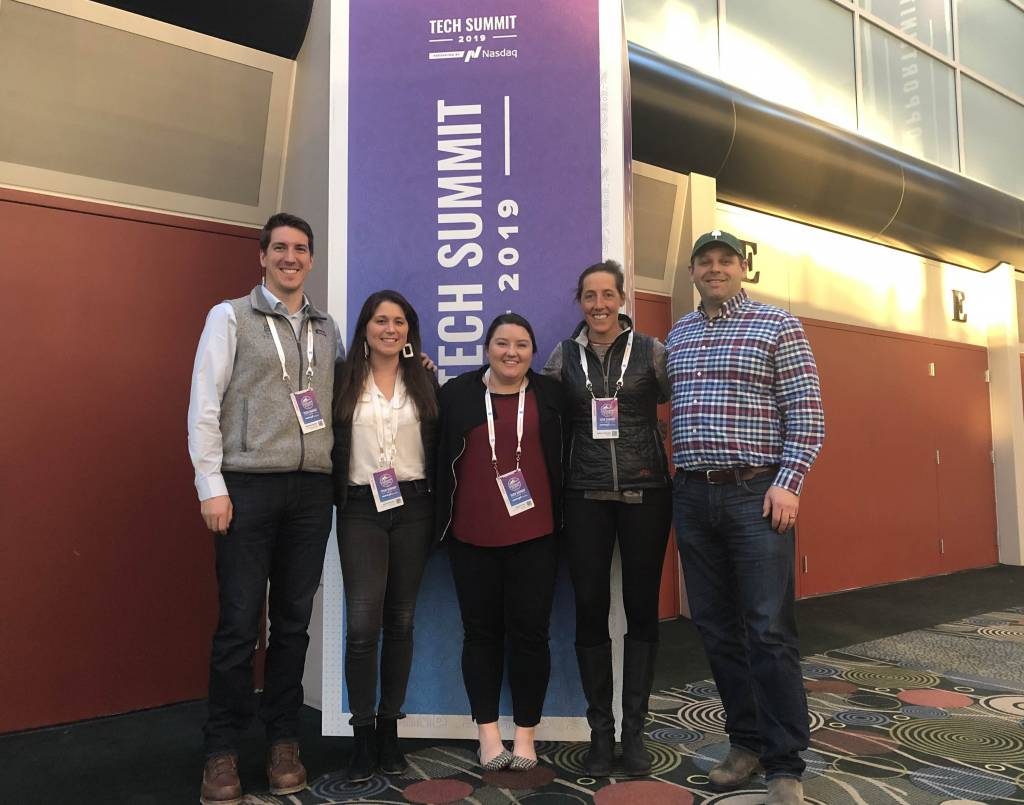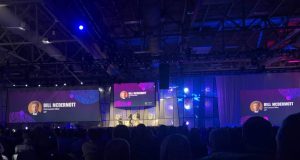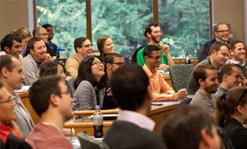Lessons Learned from Silicon Slopes 2019
March 29th, 2019Topics: Big Data / Analytics Enterprise IT Entrepreneurial Tech Privacy Talent & Workforce

We (CDS MBA Fellows Heidi Fisher, Mike Hanley, and Jenna Romeo) recently had the opportunity to attend the Silicon Slopes Tech Summit in Salt Lake City Utah. The conference was an opportunity to see, in practice, a lot of the topics we discuss in the Center, from transforming business models to data privacy. Over the course of two days, we learned from some of the best and brightest in the tech industry and beyond, hearing from leaders representing organizations ranging from traditional market leaders to innovative startups. Across the two days at Silicon Slopes, one theme stood out to us above the rest: what you, as an entrepreneur or business leader, should do when in doubt:
Lesson: When in doubt…look beyond Silicon Valley.
During the Silicon Slopes event, we were continually impressed with the tech footprint in cities like Salt Lake City and Provo, making Utah a veritable hub of engineers, entrepreneurs, and innovators – and somehow, they’re doing it all without caffeine! Silicon Slopes kicked off the conference with the CEO’s of SAP and Qualtrics to discuss SAP’s recent acquisition of the Utah-based company for $8 billion, effectively cementing Utah’s place in the global tech landscape with the largest enterprise software acquisition in history. We quickly learned that many other prominent tech companies were either headquartered or heavily invested in Utah, and that Utahns were extremely proud of their growing tech scene. So proud, in fact, that the state of Utah is throwing immense investment into STEM education. The founders of Silicon Slopes each committed $1 million dollars to match state funding for investing in early STEM education. Building off of University of Utah’s already deep roots in technology (they were one of the first four universities to be part of the ARPAnet after all), Silicon Slopes partnered to launch a new MBA program with Utah Valley University, focused on digital literacy and engagement with the Salt Lake City tech community. Clearly, Utah’s existing tech community and future investments point to an increasingly vibrant tech community and the possibility that the Silicon Slopes will soon challenge Silicon Valley for some of the best talent.
Lesson: When in doubt…Attack!
 The biggest news to come out of SLC’s technology scene was SAP’s record-setting $8 billion dollar acquisition of Qualtrics. While large enterprise software companies make up the bulk of the local industry, the start-up scene in Utah is alive and buzzing with excitement. Salt Lake City is the perfect environment for risk takers and innovators to nurture their ideas into a new business. With a large, tech-educated workforce and a local culture founded by dreamers and builders, look at SLC as the next hotbed of disruptive tech companies. The Silicon Slopes Startup Competition was the perfect demonstration of the energy and support behind the next wave of tech companies to arise out of Utah. With a grand prize of $250,000, thirty-two teams faced off in the final round during the summit with only one winner taking home the seed money. Or at least, that was the original plan. Blown away by the quality of ideas during this year’s startup competition, not only was a grand prize awarded to the winners but the four other top teams received $50,000 in investment as well from the Silicon Slopes Board.
The biggest news to come out of SLC’s technology scene was SAP’s record-setting $8 billion dollar acquisition of Qualtrics. While large enterprise software companies make up the bulk of the local industry, the start-up scene in Utah is alive and buzzing with excitement. Salt Lake City is the perfect environment for risk takers and innovators to nurture their ideas into a new business. With a large, tech-educated workforce and a local culture founded by dreamers and builders, look at SLC as the next hotbed of disruptive tech companies. The Silicon Slopes Startup Competition was the perfect demonstration of the energy and support behind the next wave of tech companies to arise out of Utah. With a grand prize of $250,000, thirty-two teams faced off in the final round during the summit with only one winner taking home the seed money. Or at least, that was the original plan. Blown away by the quality of ideas during this year’s startup competition, not only was a grand prize awarded to the winners but the four other top teams received $50,000 in investment as well from the Silicon Slopes Board.
Salt Lake City techies are already at work attacking conventional business practices with technology. When Chris Gibson took a leave from medical school to found and grow Recursion, his AI powered pharmaceutical company, he did so with a simple idea: Can we bring the development strategy of “fail fast” to the world of pharmaceutical drug discovery? So he partnered with Blake Borgeson who had been using machine learning in his bioinformatics PhD research to see how AI can attack the complex process of pharmaceutical R&D. Doing so was a challenge, both operationally and philosophically. The scientific method is purposefully rigid and well-defined to secure the believability of discoveries. Yet, Chris and Blake challenged the traditional method of defining a specific hypothesis and testing one thing at a time. With the computational power and speed of AI, Recursion’s business model is to instead take multiple hypotheses and to run thousands of different experiments all at once while letting computer vision analysis to guide researchers towards the more promising opportunities while steering them away from likely duds. As the team at Recursion says, the proof is in the pipeline as the technology has already resulted in thirty-two recognized discoverers, eight preclinical trials, and two Phase 1 drugs. While the AI does not (yet) provide an understanding of molecule interactions, Recursion has their eyes set on attacking that challenge next.
Lesson: When in doubt…delete.
In a session on The Trust Deficit: Why Tech Must Make Trust Its #1 Priority, Fast Company reporter Lydia Dishman said that when in doubt, companies should delete customer data. The advice appeared to split the room; with a recent Economist article claiming data has outstripped oil as the world’s most valuable asset, the idea of tossing customer data that may prove useful in the future seemed unfathomable to a few. While, on the other side, the changing regulatory landscape and growing liability of public data breaches had the majority cheering her advice. With customer trust becoming an increasingly prominent asset, will it eventually outstrip hordes of data as the most valuable commodity? If so, it will be the companies who have bucked the practice of collecting as much data as possible and figuring out what to do with it later that will emerge the winners.











